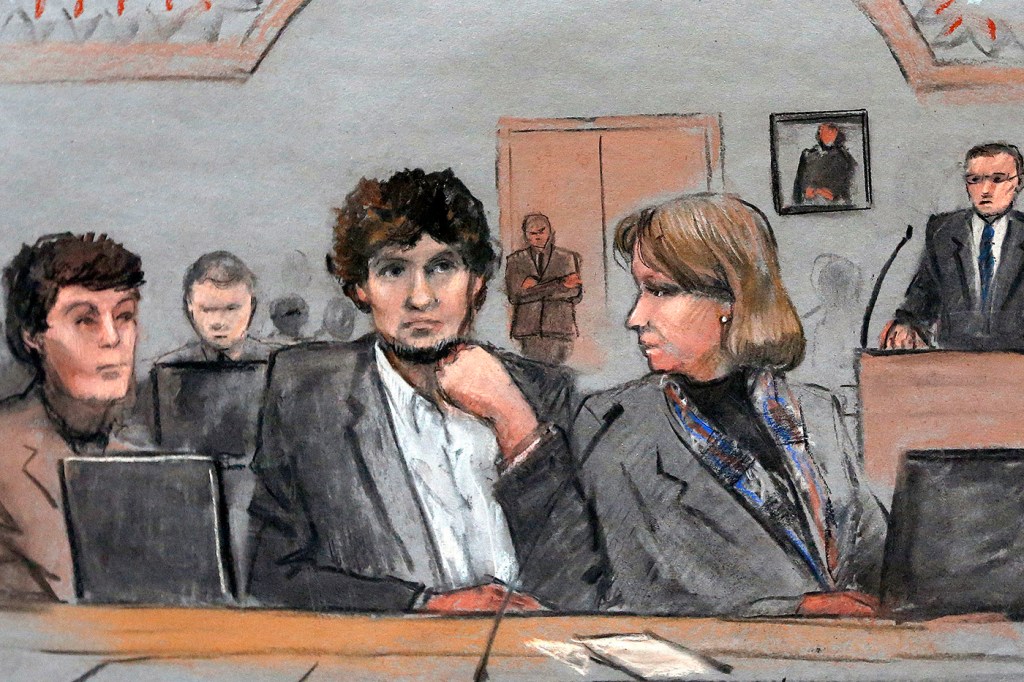The Supreme Court reinstated the death penalty for the Boston Marathon bomber. What does that mean for capital punishment in the US?

The U.S. Supreme Court reinstated the death penalty for Dzhokhar Tsarnaev, who was convicted of helping to carry out the 2013 Boston Marathon bombings—a narrow ruling that nonetheless speaks volumes about the high court’s attitude toward death sentences, says a Northeastern law professor.
The attack, which Tsarnaev was convicted of carrying out with his brother, Tamerlan, killed three people and injured hundreds. The Tsarnaevs detonated two homemade bombs, made of pressure cookers and filled with nails and ball bearings, in the crowds of people watching the annual road race. After the bombs went off, police tracked the brothers throughout Greater Boston, and Tamerlan was killed in a shootout.

Left to right: Michael Meltsner, the George J. and Kathleen Waters Matthews Distinguished University Professor of Law and Daniel Medwed, University Distinguished Professor of Law and Criminal Justice. Photos by Matthew Modoono/Northeastern University
Although Massachusetts abolished the death penalty, Dzhokhar Tsarnaev was convicted on 30 terrorism-related charges and sentenced to death on six of them in federal court. Tsarnaev didn’t contest his guilt but appealed his death sentences.
A three-judge panel of the U.S. Court of Appeals for the First Circuit, in Boston, upheld Tsarnaev’s convictions in 2020 on 27 counts. But the appeals court ruled that his death sentence should be overturned because the trial judge had not questioned jurors closely enough about their exposure to pretrial publicity and had excluded evidence concerning previous criminal behavior of Tamerlan Tsarnaev.
In the Supreme Court’s 6-3 ruling, issued last Friday, justices reversed the 2020 ruling that threw out Tsarnaev’s death sentence.
Here’s what that means—and what it doesn’t mean.
It doesn’t mean that the death sentence is back on the table in all cases. Twenty-six states in the U.S. have either fully abolished the death penalty or have a moratorium on capital punishment in place, and the Supreme Court’s ruling doesn’t change that.
“This is a narrow decision about a particular case, so there’s no general applicability,” says Michael Meltsner, the George J. and Kathleen Waters Matthews Distinguished University Professor of Law at Northeastern.
In fact, the decision doesn’t even mean that Tsarnaev will be put to death any time soon. The Biden administration restarted a moratorium on federal executions that the previous administration ended, so that the Justice Department can conduct a thorough review of the department’s policies and procedures.
The real importance of the decision, Meltsner says, is that it signals that the Supreme Court “has no interest in limiting, much less abolishing, the death penalty, despite its withering support in the U.S.”
Indeed, since 2007, 11 states across the country have abandoned capital punishment, and 35 states haven’t executed anyone in the last decade, Meltsner says. In 2021, only 11 people were executed. By comparison, more than 24,000 homicides occur in the U.S. each year, according to statistics by the federal Centers for Disease Control and Prevention.
Meltsner and Daniel Medwed, University Distinguished Professor of Law and Criminal Justice at Northeastern, wrote an op-ed on the capriciousness of the death penalty at the end of February.
When the state is carrying out death sentences upon such a small fraction of people convicted to death, “it’s impossible that it advances any kind of rational public policy,” Meltsner says. “The threat of the death penalty clearly doesn’t deter crime.”
The Supreme Court’s ruling in Dzhokhar Tsarnaev’s case, however, shows that it’s unwilling to roll back the death penalty, Meltsner says.
“The present Supreme Court is an ideological one that’s not sensitive to opinion polls or popular views,” he says. “I see no evidence that the court is interested in changing the death penalty.”
For media inquiries, please contact Marirose Sartoretto at m.sartoretto@northeastern.edu or 617-373-5718.





